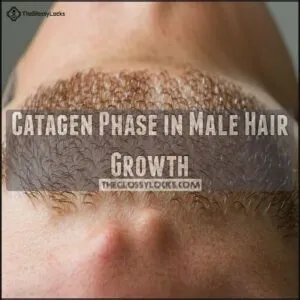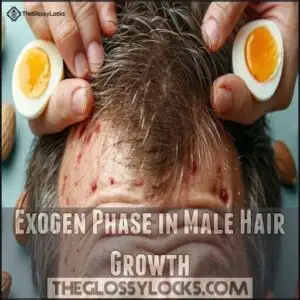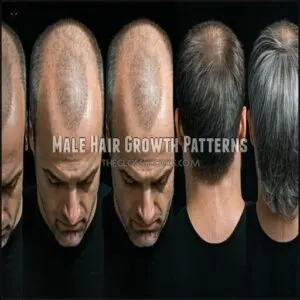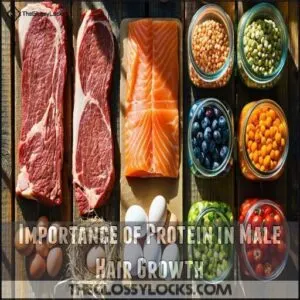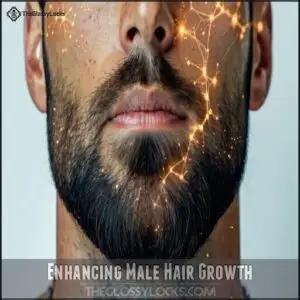This site is supported by our readers. We may earn a commission, at no cost to you, if you purchase through links.

Age, hormones like testosterone, and even your overall health can play a big role in how fast it grows.
Think of it like grass—if the “soil” (your scalp) isn’t healthy, growth slows down.
The hair growth cycle includes active growing (anagen), shedding (catagen), resting (telogen), and releasing old strands (exogen).
Curious about boosting your growth with better nutrition or avoiding common hair loss issues? Stay tuned for tips that could make all the difference.
Table Of Contents
- Key Takeaways
- Male Hair Growth Basics
- Male Hair Growth Cycle
- How Fast Does Male Hair Grow
- Male Hair Growth Patterns
- Promoting Healthy Male Hair Growth
- Common Male Hair Growth Problems
- Enhancing Male Hair Growth
- Frequently Asked Questions (FAQs)
- How fast does hair grow in a month?
- What works best for hair growth quickly?
- Does hair grow faster male or female?
- How fast does scalp hair grow?
- How long does body hair grow?
- How long does hair grow on your head a year?
- What is the difference between curly hair and straight hair?
- How much hair are we born with?
- Why do we get gray hair?
- Why do we have hair in the first place?
- Conclusion
Key Takeaways
- Your hair grows about half an inch a month, or six inches a year, depending on your genetics, age, and overall health.
- A healthy diet with protein, biotin, and omega-3s, coupled with stress management and good scalp care, helps optimize growth.
- Hormones like testosterone and DHT impact the speed and pattern of your hair growth, especially as you age.
- Hair growth cycles through four phases (anagen, catagen, telogen, and exogen), and keeping your scalp healthy supports steady hair growth.
Male Hair Growth Basics
Your hair grows at an average rate of about half an inch per month, with the exact speed influenced by factors like age, genetics, and overall health.
Hair grows about half an inch monthly, driven by age, genetics, and your health—keep it nourished for the best results.
You’ll notice your fastest hair growth between ages 15 and 30, after which growth naturally slows down as hormonal changes occur.
Average Hair Growth Rate for Men
Most men’s hair grows at a rate of 0.5 inches (1.2 cm) monthly.
Your genetic predisposition largely determines this growth rate, with peak development occurring between ages 15-30.
Regional differences and ethnicity influence also play roles in how fast your hair grows. Seasonal variation exists too—hair often grows faster in summer months.
While proper nutrition supports healthy follicles, remember that your natural hair growth rate has biological limits that even the best care routines can’t dramatically exceed, and this is influenced by your genetic predisposition.
Factors Influencing Male Hair Growth
While average growth rates provide a baseline, your hair’s journey is uniquely yours.
Several key factors influence male hair growth:
Your genetics set the foundation, determining your natural growth potential and pattern.
Nutritional status matters substantially—deficiencies in protein, iron, biotin, and zinc can slow growth.
Stress impacts your follicles directly, pushing them into a resting phase prematurely.
Medical treatments, particularly chemotherapy, can alter growth patterns.
Age plays a role too, as growth typically slows after 30.
Poor sleep and harsh styling further compromise your hair’s health and growth rate.
Lifestyle adjustments, such as reducing stress levels, can also improve scalp health and potentially enhance your natural growth potential by addressing factors like stress and nutritional status.
The Role of Hormones in Male Hair Growth
Now that you understand what affects male hair growth, let’s look at how hormones specifically impact your hair.
Your hormones play a critical role in determining hair growth speed.
Testosterone converts to DHT (dihydrotestosterone) in your scalp, which can shrink hair follicles when present in high amounts.
This DHT impact is why some men experience thinning or male pattern baldness despite good hair care.
As you age, testosterone levels naturally decline from their peak in your 20s, slowing hair growth men experience.
Genetic predisposition also influences how sensitive your follicles are to hormonal imbalances.
The good news? Understanding these aging effects helps you take control.
Some treatments target DHT conversion specifically to maintain healthy growth patterns.
Male Hair Growth Cycle
Your hair cycles through four distinct phases—anagen (growth), catagen (transition), telogen (rest), and exogen (shedding)—which determine how quickly you’ll see new growth.
Understanding this cycle can help you optimize your hair care routine and identify when something might be disrupting your normal growth pattern.
Anagen Phase in Male Hair Growth
During the anagen phase, your hair actively grows for 2-8 years, powering the most vital part of the hair growth cycle in men.
This growth powerhouse determines your overall hair length potential, with follicles producing about 0.5 inches monthly.
To maximize your anagen duration:
- Protect follicle health by avoiding tight hairstyles that cause tension
- Consume nutrients like protein and iron that support cell regeneration
- Manage stress levels which can shorten this growth phase
- Consider your DHT sensitivity, as it affects how genetics influence your growth pattern
Unlike the upcoming catagen phase, this active growth period responds well to proper care and nutrition.
Catagen Phase in Male Hair Growth
During the catagen phase, your hair takes a short break from growing.
This interim period typically lasts 2-3 weeks and serves as a vital part of the hair growth cycle.
| Catagen Phase | What Happens |
|---|---|
| Duration | 2-3 weeks |
| Follicle Changes | Shrinks & detaches |
| Growth Signals | Ceases temporarily |
During this phase, follicles shrink and detach from their blood supply. Stress, hormonal imbalances, and high DHT levels can push more hairs into catagen prematurely.
This growth cessation is normal but can be minimized with stress management techniques. Consider the catagen phase as your hair’s "reset button" before entering the resting telogen phase.
Telogen Phase in Male Hair Growth
The telogen phase represents your hair’s vacation period, lasting approximately 2-3 months.
During this resting stage, about 10-15% of your follicles take a break from growing. For men, telogen duration typically runs shorter than in women.
When stressed, you might experience telogen effluvium, where excessive hairs enter this phase simultaneously, causing noticeable shedding.
Maintaining proper nutrition and stress management supports follicle recovery and helps balance your hair growth cycle.
Exogen Phase in Male Hair Growth
After the telogen resting period, your hair enters the exogen phase—when older strands make way for new growth.
During this 2-5 month shedding duration, you’ll naturally lose 50-100 hairs daily.
To maintain healthy follicle activity and minimize excessive shedding:
- Apply gentle male grooming techniques
- Consume protein-rich foods supporting hair growth
- Manage stress, a common exogen trigger
Regular trims help optimize your hair growth rate and encourage stronger regrowth.
How Fast Does Male Hair Grow
Your hair grows at a rate of approximately 0.5 inches per month, which equals about 6 inches of new growth annually.
You’ll notice faster growth during your teens and twenties, with the pace gradually slowing after age 30 due to natural hormonal changes.
Monthly Male Hair Growth Rate
Most men’s hair grows at an average rate of 0.5 inches (1.27 cm) per month—about the width of a pencil eraser.
This monthly hair growth rate isn’t identical for everyone, with ethnic differences playing a significant role. Measurement methods show seasonal variations too, with faster growth typically occurring during summer months.
Your genetic makeup largely determines your personal rate, but influencing factors like nutrition and hormone levels can optimize results. A protein-rich diet supports this monthly increase, while stress can slow it down.
The hair’s growth progresses through distinct cyclical phases. For consistent men’s hair growth, focus on scalp health—the foundation of how fast hair grows, and consider the impact of genetic makeup on your hair’s growth rate.
Daily Male Hair Growth Rate
Looking at your scalp each day, hair grows approximately 0.35 millimeters—seemingly imperceptible yet steady progress influenced by genetic factors and daily variance in your body’s functioning.
To maximize your hair growth rate:
- Consume protein-rich foods that support follicle health
- Manage stress levels that can disrupt normal growth cycles
- Monitor regional differences in growth across your scalp
- Stay hydrated to maintain ideal conditions for measuring growth
Male Hair Growth Rate by Age
While tracking daily growth is useful, age substantially impacts how quickly your hair grows.
Your growth rate naturally declines as you age. In your teens and twenties, testosterone peaks drive growth up to 0.4mm daily. After 40, this typically slows to around 0.2mm daily.
Three factors affecting this age-related change:
- Hormonal shifts – testosterone levels decline gradually
- Shorter anagen phases – growth cycles become briefer
- Genetic predisposition – family history influences both growth rate and male pattern baldness
Senior growth often shows not just slower extension but thinner strands, making maintenance strategies increasingly important.
Male Hair Growth Patterns
You’ll notice distinct growth patterns in your hair as you age, with most men experiencing changes in thickness and coverage over time.
Your genetics largely determine these patterns, affecting how quickly your hair grows and whether you’ll face male pattern baldness, which impacts over half of men after age 50, a condition influenced by your genetics.
Male Pattern Baldness
Androgenetic alopecia affects up to 80% of men by age 80. This condition stems from DHT sensitivity in hair follicles, causing progressive miniaturization and decreased hair growth rates in affected areas.
One of the primary factors is increased DHT production in susceptible individuals.
| MPB Characteristic | Description |
|---|---|
| Primary Cause | Genetic predisposition from either parent |
| First Signs | Receding hairline/crown thinning |
| Progression | Hair cycle shortens from years to months |
| Hair Growth Rate | Follicles produce fewer, finer hairs |
| Treatment Options | Early detection improves outcomes for hair regrowth |
The characteristics of MPB, including its primary cause, first signs, progression, and impact on hair growth rate, highlight the importance of understanding this condition for effective management and potential hair regrowth.
Factors Contributing to Male Pattern Baldness
While male pattern baldness stems from various factors, understanding them helps manage your expectations about hair growth men typically experience.
- Genetic Predisposition: Your family history largely determines follicle miniaturization patterns
- DHT Sensitivity: This hormone gradually shrinks follicles, leading to mens hair growth challenges
- Lifestyle Factors: Poor nutrition, stress, and inadequate sleep accelerate male thinning
- Ageing Effects: Hair growth rate men experience naturally declines with age
Hair loss isn’t entirely preventable when genetics are involved, but managing these other factors can slow its progression.
Male Hair Loss Due to Aging
While genetics trigger male pattern baldness, aging brings its own hair challenges.
As you get older, your follicles naturally weaken through a process called follicle miniaturization. DHT sensitivity increases with age, shrinking hair follicles until they can’t produce visible hair.
The aging hairline typically recedes at the temples first, while crown thinning creates that characteristic pattern. Men’s hair growth rates also slow down after age 50.
This table shows how aging affects your hair:
The key factors to consider are DHT sensitivity, hair growth rates, and the overall impact of aging on hair health, including male pattern baldness and the importance of a balanced diet.
Promoting Healthy Male Hair Growth
You’ll boost your hair’s growth potential by maintaining a nutrient-rich diet with adequate protein, essential vitamins, and proper hydration.
You can further support healthy follicles by managing stress levels and establishing gentle hair care habits that avoid harsh chemicals and excessive heat styling.
Nutrition for Healthy Male Hair Growth
While hair growth patterns vary among men, your diet plays a key role in maintaining healthy hair.
Proper nutrition directly impacts how your hair grows and its overall strength.
A balanced diet rich in specific nutrients can substantially improve your hair’s condition:
- Protein intake from eggs, fish, and lean meats builds strong hair shafts
- Iron-rich foods like spinach prevent hair loss linked to deficiency
- Omega-3 fatty acids in salmon support scalp health
- Biotin-containing foods enhance keratin production
- Vitamin D strengthens follicles and promotes growth
Don’t forget hydration effects—drinking enough water helps transport nutrients to your hair follicles.
Consider omega-3 fatty acids for scalp nourishment.
Consider hair growth supplements when dietary changes aren’t enough.
Importance of Protein in Male Hair Growth
The building blocks of your hair literally depend on protein, with keratin production requiring a steady supply of amino acids through protein synthesis.
For ideal hair growth men need:
- Quality protein sources – eggs, lean meats, and legumes deliver the amino acids your follicles crave
- Consistent intake – aim for protein at every meal to support continuous hair development
- Variety in sources – mix animal and plant proteins to cover all essential amino acids
To help with dietary planning, consider exploring different protein options.
Don’t let dietary deficiency effects slow your growth!
Reducing Stress for Healthy Male Hair Growth
While protein builds the structure of your hair, chronic stress can quickly undermine your hair’s foundation.
Stress impact on hair growth men experience is significant—it can trigger telogen effluvium, pushing more follicles into the resting phase.
To combat scalp tension, incorporate relaxation techniques into your routine. Even five minutes of meditation daily can reduce cortisol levels that contribute to hair loss.
Regular exercise releases endorphins that counter stress hormones, promoting better hair health.
Don’t underestimate sleep quality—aim for 7-8 hours nightly to support your body’s natural recovery processes. Mental wellbeing directly influences your scalp’s condition.
Your lifestyle choices matter. Reducing stress won’t just improve your mood—it’ll help maintain the steady hair growth you’re working toward.
Common Male Hair Growth Problems
You’ll encounter several challenges that can slow down your hair growth, including medical conditions, medication side effects, and improper hair care habits.
Understanding these common problems can help you identify and address the specific issues affecting your hair, allowing you to take appropriate steps toward healthier growth.
Male Hair Loss Due to Medical Conditions
While nourishing your body helps healthy growth, certain medical conditions can signal trouble for your hair.
Certain health issues disguise themselves as hair loss—don’t ignore the signs your scalp might be showing.
Beyond genetic predisposition, your body might be fighting against itself. Autoimmune diseases like alopecia areata can cause patchy loss, while thyroid disorders disrupt normal growth cycles.
Vitamin deficiencies—particularly B12, zinc, and iron—often manifest as thinning hair before other symptoms appear. Even celiac disease can affect your scalp health.
If you’re experiencing unusual hair loss, don’t self-diagnose—these could be warning signs of underlying health issues.
Male Hair Loss Due to Medications
Many prescription bottles quietly list "hair loss" among possible side effects, turning medicine cabinets into potential culprits for thinning hair.
Drug-induced alopecia occurs when medications interfere with factors affecting hair growth, pushing follicles into premature rest phases.
Common medication side-effects include hair shedding from:
- Antidepressants and mood stabilizers
- Blood pressure medications like beta-blockers
- Cholesterol-lowering statins
- Chemotherapy treatments (most severe)
- Acne medications containing retinoids
Before discontinuing any prescription, consult your doctor about alternatives. The good news? Most medication-related hair thinning reverses after stopping the treatment, with hair growth reversal typically beginning within 3-6 months, which can lead to a significant improvement in hair loss issues, and overall hair health.
Male Hair Loss Due to Poor Hair Care
Your hair care habits directly impact growth and can accelerate hair loss in men.
Harsh chemicals, tight hairstyles, and infrequent trims damage follicles and cause hair breakage. Product buildup and scalp neglect further compromise healthy growth.
| Poor Practice | Effect | Solution |
|---|---|---|
| Tight hairstyles | Traction alopecia | Looser styles |
| Poor shampooing | Scalp irritation | Gentle cleansing |
| Chemical damage | Split ends | Natural products |
Think of your scalp as garden soil—it needs proper care to produce strong, healthy hair.
Addressing these issues often requires specialized breakage products for effective repair. This approach can help mitigate hair loss and promote healthy growth, leading to a fuller and more vibrant head of hair, which is the ultimate goal of proper hair care.
Enhancing Male Hair Growth
You’ll find several effective options to boost your hair growth beyond its natural rate of about half an inch per month.
From scientifically-backed supplements to advanced treatments like low-level laser therapy and platelet-rich plasma, these methods can help you maximize your follicular potential.
Male Hair Growth Supplements
Looking for a hair boost? Quality hair growth supplements men trust contain essential nutrients like biotin, vitamin D, and zinc that support follicle health.
For maximum supplement efficacy, choose products with clinically-proven ingredients like saw palmetto to block DHT. Many men find biotin supplements beneficial for hair health.
Start with recommended dosage guidelines—more isn’t always better and may cause potential side-effects. Watch for supplement interactions with medications you’re taking.
Can’t stomach pills? Natural alternatives like protein-rich foods and scalp massage offer similar benefits for male hair regrowth without the bottle, utilizing clinically-proven ingredients and supporting overall follicle health.
Low-Level Laser Therapy for Male Hair Growth
When you’re seeking advanced solutions beyond supplements, low-level laser therapy (LLLT) presents a promising option for male hair regrowth.
This non-invasive treatment uses specific wavelengths of red light to stimulate your follicles.
The laser mechanism works by:
- Increasing blood flow to your scalp
- Enhancing cellular metabolism in follicles
- Reducing inflammation that inhibits growth
Most men see improvements within 3-6 months of consistent treatment, with professional therapy often yielding better results, and home devices offering convenience. Side effects are minimal, making LLLT a safe addition to your hair growth strategy.
Platelet-Rich Plasma Therapy for Male Hair Growth
If low-level laser therapy offers a supportive framework, PRP therapy adds a high-tech edge to hair regrowth in men.
This treatment taps into your own blood, concentrating hair growth factors like PDGF and VEGF, then injecting them into the scalp to stimulate follicles.
Clinical results show PRP’s effectiveness, with noticeable increases in density and thickness after multiple sessions.
It’s not a quick fix or a cure for bald spots, but for tackling early thinning, PRP stands out.
The DEPA classification scores PRP quality from AAA to DDD.
Expect mild side effects like redness or swelling.
While the treatment cost can be higher than basic hair growth products for men, long-term results often make it worth the investment.
Frequently Asked Questions (FAQs)
How fast does hair grow in a month?
Your hair typically grows about half an inch (2 cm) per month, though it varies.
Factors like age, genetics, and health play a role.
For most, that’s roughly the length of your thumb’s tip, or about half an inch.
What works best for hair growth quickly?
To boost growth, focus on a balanced diet rich in protein, biotin, and omega-3s.
Stay hydrated, manage stress, and avoid harsh chemicals.
Gentle scalp massages improve blood flow—think of it as exercise for your hair!
Does hair grow faster male or female?
You’d think hair grows the same for everyone, but men’s hair edges out slightly faster than women’s.
This happens because testosterone stimulates follicles, speeding growth, though differences are tiny—just another perk of biology!
How fast does scalp hair grow?
Scalp hair grows about half an inch per month, or six inches annually.
That’s roughly 35 millimeters daily.
Growth varies with genetics, age, and health, so taking care of your hair and scalp really matters!
How long does body hair grow?
Body hair has a shorter growth cycle than scalp hair, lasting just months.
It stops after reaching a certain length due to the anagen phase’s brevity, making regular trims or shaving part of many routines.
How long does hair grow on your head a year?
Hair on your head grows about six inches a year.
That’s roughly half an inch each month.
Of course, factors like genetics, age, and health can tweak the pace, but that’s the general rule.
What is the difference between curly hair and straight hair?
As the saying goes, "variety is the spice of life."
The main difference is shape—curly hair grows in elliptical follicles, causing curls, while straight hair grows in round follicles, making it smoother and straighter.
How much hair are we born with?
You’re born with about 5 million hair follicles, which is all you’ll ever get.
Around 100,000 of those follicles are on your scalp, ready to grow hair that follows its unique growth cycle over time.
Why do we get gray hair?
Think of your hair as a clock ticking away.
Gray hair happens when pigment cells in hair follicles stop producing melanin.
Aging, genetics, and stress can speed this up, making your hair lose its color.
Why do we have hair in the first place?
Your body uses hair for protection, warmth, and sensory input.
It shields your scalp from sunlight, keeps you warm in cold weather, and helps you sense slight movements, like a gentle breeze or crawling insect.
Conclusion
Think of your hair like a tree—it grows slow and steady, about half an inch a month, depending on your age, health, and hormones.
Understanding how fast hair grows men requires awareness of its growth cycle and factors affecting it.
A healthy diet, regular scalp care, and managing stress can boost growth.
Avoid habits that damage hair, like over-styling or poor nutrition.
With the right care, you’ll see improvements in your hair’s health and growth over time, and maintaining a healthy diet is crucial.



